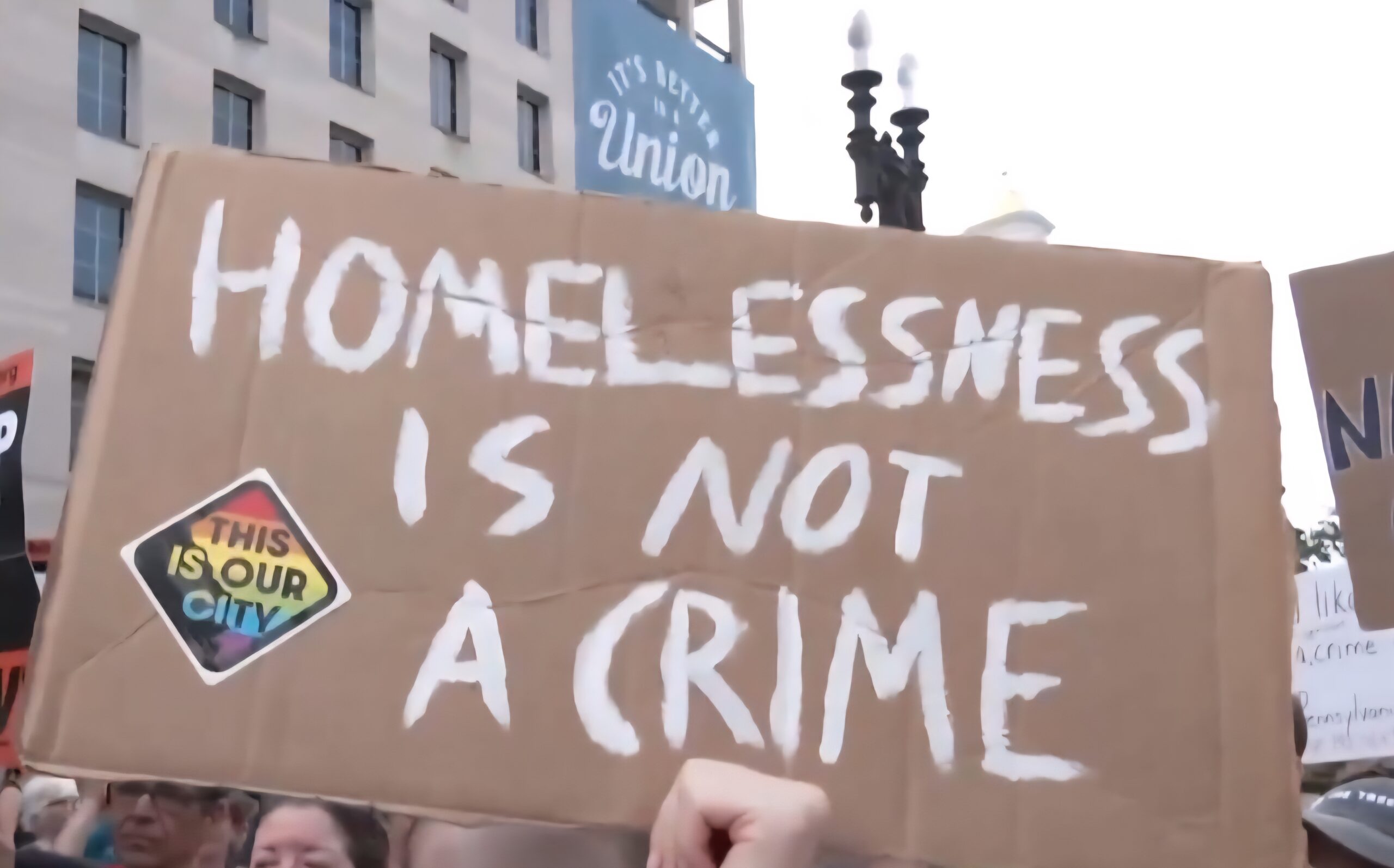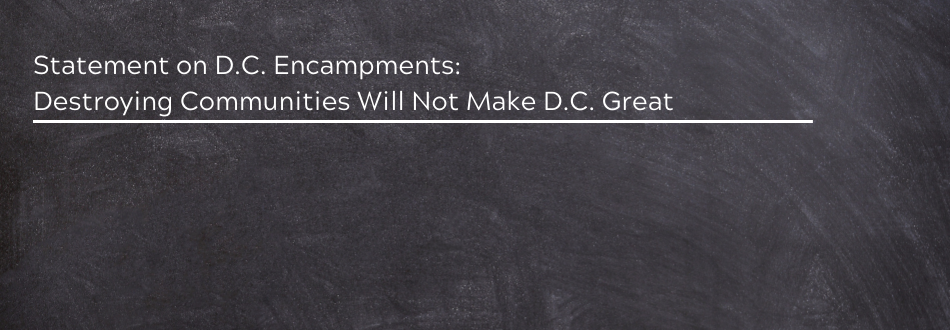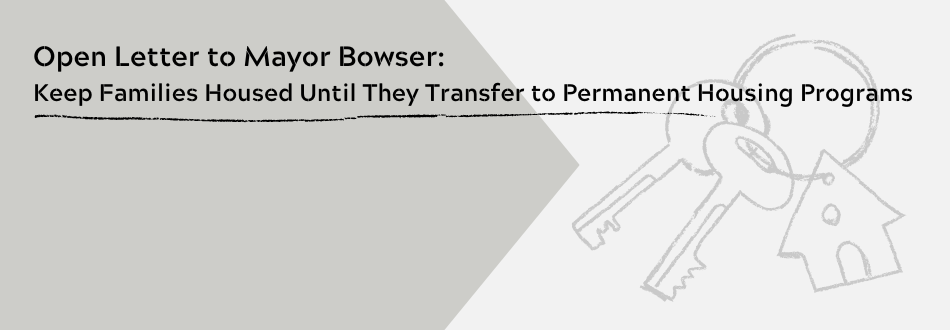By Brittany K. Ruffin, Legal Director, Systemic Advocacy and Litigation; Joshua Drumming, Staff Attorney; and Charisse Lue, Staff Attorney
On July 28, D.C.’s FY 2026 budget process concluded. From the start, the budget season was riddled with delays and extensions caused by a series of local and congressional budget actions. Unfortunately, the mayor’s proposed budget left much to be desired. Once again, it underfunded or failed to fund critical housing resources and programs within the Department of Human Services (DHS), setting up another fiscal year in which D.C.’s lowest-income residents have to split inequitable investments. Like last year, those who need the most support in the budget had to do the most advocacy to have their needs represented in D.C. Council’s final budget. While several months of advocacy resulted in a less harmful budget than originally intended by the mayor and some important investments, the final FY26 Budget was an extremely disappointing budget for housing resources. D.C. government and its residents will certainly feel the impact of the overall disinvestment in the year to come.
Over the last couple of years, despite increasing homelessness, the mayor funded no new housing vouchers in her proposed budgets. All vouchers that ended up in the budget were solely D.C. Council investments. This year, we were pleased to see an initial voucher investment by the mayor to fund 156 Permanent Supportive Housing (PSH)-Family vouchers (for families being terminated by the mayor’s administration from the Family Re-Housing Stabilization Program (FRSP)). However, the mayor included zero housing vouchers for homeless individuals. Of course, the best way to end homelessness in D.C. is by adequately funding vouchers of all types (PSH, TAH, and LRSP) for individuals and families. Fortunately, D.C. Council funded an additional 160 Targeted Affordable Housing (TAH) vouchers and twenty (20) PSH-Family vouchers in the final budget. Those vouchers will end homelessness for hundreds of households with minor children; however, a total of 336 housing vouchers is still less than nine percent (9%) of the family voucher need. Unfortunately, individuals experiencing homelessness were fully neglected in the final FY26 budget, receiving no funding at all for safe, permanent housing, for the first time in over a decade. This lack of investment in housing resources for individuals is particularly shameful and devastating as unsheltered residents are targeted by the local and federal government for simply existing in public spaces.
The dismantling of the Emergency Rental Assistance Program (ERAP) continued in this budget, and the mayor funded even less for the Emergency Rental Assistance Program (ERAP) than last year. Even with an additional D.C. Council investment, the final FY26 amount ($8.6 million) is approximately sixty-eight percent (68%) less than in FY25 (FY26 investment will increase to $11.6M if there is later revenue growth). The total FY26 investment to fund repairs and rehabilitation of DCHA’s aged and dilapidated public housing stock was also less than in previous years. While the mayor made a FY26 and FY27 investment, the FY26 final amount ($26.2 million) was significantly less than previous years and approximately forty-four percent (44%) of the annual recommendation. We were pleased to see the mayor return to fully funding the Housing Production Trust Fund (HPTF) at $100 million, the recommended investment. In the final FY26 budget, D.C. Council increased the funding to $110 million, provided there is later revenue growth.
Two of the most notable housing advocacy “wins” in the FY26 budget were the removal of unexpected policies proposed by the mayor in the Budget Support Act (BSA). In one subtitle, the mayor attempted to quietly change the definition and eligibility for project-based LRSP, raising the limit from 0-30% AMI to 0-50% AMI and creating an incentive for further neglect of deeply affordable housing creation by developers. This change would have had a critical impact on D.C.’s affordable housing creation infrastructure, reversing the recent D.C. progress in HPTF funding of 0-30% AMI housing development. Fortunately, D.C. Council advocacy prevailed, and the proposed change was removed from the BSA. In another subtitle, the mayor attempted to reverse established law that requires D.C. to provide non-congregate (private) shelter to families experiencing homelessness. Hundreds of advocates and community members joined together to successfully convince D.C. Council to stop the mayor’s covert attempt to change long-standing D.C. policy and increase harm to families with minor children seeking emergency shelter. These policy proposals were removed from the FY26 BSA and are evidence that hard-fought advocacy works; however, they were advocacy “fights” that never should have had to happen.
Unfortunately, in the same BSA subtitle where the mayor attempted to roll back family shelter protections, she, for a consecutive year, successfully proposed legislation to further harm Rapid Re-Housing Program families and individuals by removing program protections so that participants could be terminated more quickly. In particular, participants will no longer have the right to stay in the program while they appeal an exit, meaning hundreds of households will face eviction for unpaid rent before they ever have a hearing on whether the exit was lawful.
D.C. is too well-resourced to continue the pattern of de-prioritizing the human service needs of its residents. Between the additional cuts to ERAP, D.C. Council limiting eligibility for emergency rental assistance (ERAP), underinvestment in housing vouchers, the termination of families and individuals from the Rapid Re-Housing Program, and further FY26 cuts to ERAP funding, homelessness and housing insecurity will undoubtedly increase. The yearly decision to prioritize slashing the funds and programming for critical human services and needs has real and debilitating consequences for D.C. residents and the homeless services system. The unfortunate reality is that D.C. government will have to pay for its disinvestment, one way or another. Insufficient investment in permanent affordable housing and eviction prevention now will result in more harm and increased need later. We must continue to urge D.C. government to prioritize the basic needs of its residents, elevate the resources and investments that keep people safely and permanently housed, and disrupt the pattern of disinvestment towards marginalized communities that has become all too familiar.
** Check out all of Legal Clinic’s 2025 funding and reform recommendations here.
| Program | Recommendation | Outcome | Percentage |
| TAH | 3058 vouchers | 160 vouchers | 5% |
| PSH-Families | 764 vouchers | 176 vouchers | 23% |
| PSH-Individuals | 1200 vouchers (multi-year ask) | 0 vouchers | 0% |
| LRSP tenant vouchers | 800 vouchers | 0 vouchers | 0% |
| LRSP vouchers for returning citizens | 60 vouchers | 0 vouchers | 0% |
| Public Housing Repairs | $60M | $26.2M | 43.6% |
| HPTF | $100M | $100M ($110M, if later revenue increase) | 100% (potentially 110%) |
| ERAP | $100M | $8.6M ($11.6M, if later revenue increase) | 8.6% (potentially 11.6%) |
| Storage funding for unhoused individuals | $1.5M | $0 | 0% |





